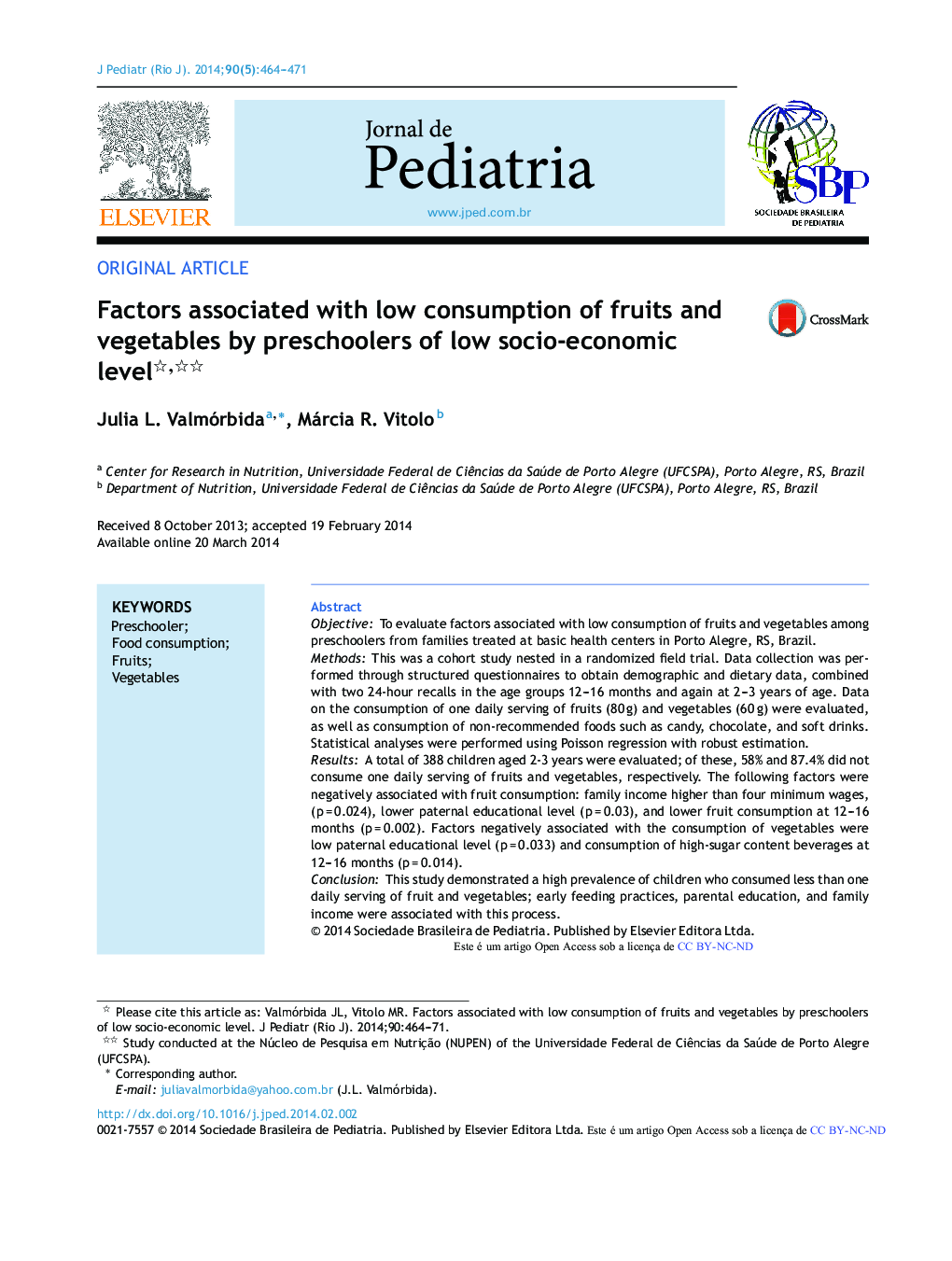| کد مقاله | کد نشریه | سال انتشار | مقاله انگلیسی | نسخه تمام متن |
|---|---|---|---|---|
| 4154004 | 1273687 | 2014 | 8 صفحه PDF | دانلود رایگان |
ObjectiveTo evaluate factors associated with low consumption of fruits and vegetables among preschoolers from families treated at basic health centers in Porto Alegre, RS, Brazil.MethodsThis was a cohort study nested in a randomized field trial. Data collection was performed through structured questionnaires to obtain demographic and dietary data, combined with two 24-hour recalls in the age groups 12–16 months and again at 2–3 years of age. Data on the consumption of one daily serving of fruits (80 g) and vegetables (60 g) were evaluated, as well as consumption of non-recommended foods such as candy, chocolate, and soft drinks. Statistical analyses were performed using Poisson regression with robust estimation.ResultsA total of 388 children aged 2-3 years were evaluated; of these, 58% and 87.4% did not consume one daily serving of fruits and vegetables, respectively. The following factors were negatively associated with fruit consumption: family income higher than four minimum wages, (p = 0.024), lower paternal educational level (p = 0.03), and lower fruit consumption at 12–16 months (p = 0.002). Factors negatively associated with the consumption of vegetables were low paternal educational level (p = 0.033) and consumption of high-sugar content beverages at 12–16 months (p = 0.014).ConclusionThis study demonstrated a high prevalence of children who consumed less than one daily serving of fruit and vegetables; early feeding practices, parental education, and family income were associated with this process.
ResumoObjetivoAvaliar os fatores associados ao baixo consumo de frutas e verduras entre pré-escolares de famílias usuárias da rede básica de saúde de Porto Alegre, RS, Brasil.MétodosEstudo de coorte aninhado a ensaio de campo randomizado. A coleta de dados foi feita por meio de questionários estruturados para obtenção de dados dietéticos e sociodemográficos, além de dois recordatórios de 24 horas nas faixas etárias de 12–16 meses e novamente aos 2-3 anos de idade. Foram avaliados os dados de consumo de uma porção diária de frutas (80 g) e verduras (60 g), além de consumo de alimentos não recomendados, como balas, chocolates e refrigerantes. As análises estatísticas foram feitas por regressão de Poisson com estimativa robusta.ResultadosForam avaliadas 388 crianças de 2-3 anos, destas 58% e 87,4% não consumiram uma porção de frutas e verduras, respectivamente. Os fatores que se mostraram negativamente associados ao consumo de frutas foram: renda familiar superior a 4 salários mínimos, (p = 0,024), menor escolaridade paterna (p = 0,03) e menor consumo de frutas aos 12–16 meses (p = 0,002). Os fatores negativamente associados à ingestão de verduras foram a menor escolaridade paterna (p = 0,033) e consumo de refrigerante aos 12–16 meses (p = 0.014).ConclusãoOs resultados deste estudo mostraram alta prevalência de crianças que consumiram menos de uma porção de frutas e verduras ao dia e sugerem que práticas alimentares precoces, escolaridade paterna e renda estão associadas a esse processo.
Journal: Jornal de Pediatria - Volume 90, Issue 5, September–October 2014, Pages 464–471
